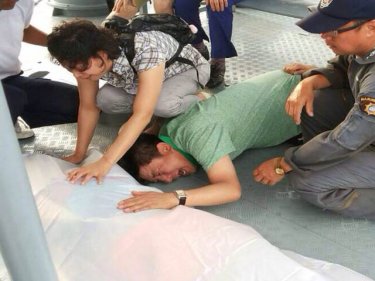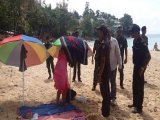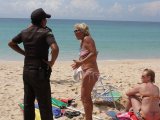The dispute raises serious concerns about levels of insurance in tourism - especially where Phuket's dangerous and highly controversial jet-skis are concerned.
''In the case of the Korean couple, insurance cover of one million baht and a 500,000 baht contribution from the owner of the speedboat is on the table'', an industry source says.
''But both families don't consider that's enough for the loss of two young people.''
Korean envoys have asked authorities to tell the Seastar company owner, Tabtep Thaugsuban, that the families are not prepared to settle for less than 10 million baht each.
''We've added 500,000 baht to insurance of one million baht each,'' company owner Khun Tabtep said, ''and covered all the travel and accommodation costs of the families, as well as the hospital costs of treating all the survivors.
''We are sorry this has happened. We have done our best to respond to the tragedy appropriately.''
The haggle over compensation is a sign that Thailand's view of appropriate sums for deaths and injuries are seriously disconnected from international reality.
This is especially true of Phuket jet-ski insurance, where the wife of a Russian man killed in a jet-ski crash at Patong earlier this month received just 150,00 baht in compensation.
Phuketwan has learned that Phuket's jet-ski operators pay just 274 baht a year for their insurance coverage. The insurance company confirmed the figure.
The astonishingly low level of insurance coverage is the major reason why there are so many disputes and alleged scams involving jet-skis.
Death and injury is too often a part of tourism in Thailand. It will remain so if dangerous, poorly maintained machines are permitted to stay on Phuket's beaches in such vast numbers.
Days after October's double-fatality crash, expat volunteer divers recovered the bodies of An Sun Yong, 28, and Go Min Woo, 31, from the sunken wreck of the day-trip speedboat between Phi Phi and Phuket.
The captain of the speedboat is likely to face a long jail term after hitting an anchor rope or net near a fishing boat and flipping his vessel, laden with tourists, into the sea on October 19.
Tourists from eight countries - China, Korea, Australia, France, Britain, Tunisia, Japan and Thailand - were returning to Phuket from a holiday outing to Phi Phi when the captain stooped to pick up an annoying plastic bag and failed to spot the trawler looming ahead.
The captain, Surat Marot O-sot, was handed over by Phuket authorities to police in the neighboring province of Krabi because the crash occurred in Krabi waters.
Russian Iliya Muryndin, 29, was killed as a result of a jet-ski crash on Phuket's Patong beach on November 4, with a payout of just 150,000 baht to his wife.
Ambassadors from Bangkok and Phuket's honorary consuls have been calling for years for jet-skis to be banned on Phuket because of the high number of scams associated with insurance claims.
Phuketwan understands that when the insurance scheme was introduced, there were three firms involved.
Two have since withdrawn and the third firm is believed to be still involved only because of pressure from the island's administrators.
The insurance covers only 50,000 baht damage so after a jet-ski crash, there's usually a haggle during which the jet-ski operator making a ridiculous initial claim.
The sum can involve as much as two or three times the replacement cost of the damaged machine with a new machine.
Riders caught in these disturbingly threatening situations are usually intimidated as other jet-ski operators gather and surround the tourist or tourists in support of the aggrieved owner.
A contact familiar with many recent scams told Phuketwan: ''There is no doubt in my mind that some jet-ski operators allow their machines to deteriorate and become unsealed and unsafe in the hope that they will be damaged.''
Usually the tourist rider involved in the crash will be made to pay an additional 16,000 baht for ''time out of the water'' - the prospect that the jet-ski could take up to five days to repair.
Often where this extra payment has been made, the ''seriously damaged'' jet-ski has been seen back in the water off Patong the next day.
With partial insurance not solving the problem but actually making it worse, Phuket authorities - who have been constantly misinformed and told there is ''no problem'' with jet-skis - will need to think again.
The best outcome would be to ban jet-skis in a phase-out, as was proposed some years ago and accepted by all involved.
Most overseas nations value the lives of their citizens much more highly than the Patong beach jet-ski operators do.
To allow these dangerous machines to continue operating means that inevitably, there will be more disputes and deaths to bring discredit to tourism and to Thailand.
A good example has been set in the neighboring provinces of Phang Nga and Krabi where jet-skis are wisely banned.
Commercial activities are now entirely banned from west coast beaches at Patong, Kamala, Karon, Kata, Surin and Bang Tao.
In view of the impossibility of achieving appropriate insurance coverage for injury and deaths, it's time jet-skis and parasails quietly disappeared.

















Good on the family for standing their ground. Whether their claim will be upheld by a court is another major hurdle. Such a compensation payment may just cause some of these operators to consider the risk against the potential liability rather than just the profit.
Posted by Manowar on November 29, 2014 17:27